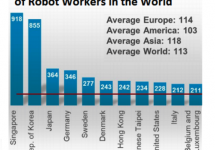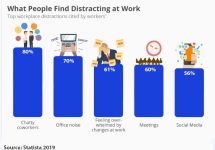
The Corona pandemic has shaken the world, it has changed the way people work and live. More than $114 million people lost their jobs in 2020, but the great thing is that half of them still feel confident and optimistic about the future.
The whirlwind of the pandemic caused sweeping changes to the way people work in our world. Remote jobs became more prevalent than ever before & an upsurge in automation is transforming how industries operate. Here’s a look at the key findings from the Future of Work report, based on the findings of the PWC survey that involved over 32,000 workers.
The respondents included office workers, business owners, contractors, part time workers and furloughed employees too. The survey included responses from workers in 19 countries. Here’s the key summary of the future of work:
1. Jobs Will be Obsolete
39% of the people think their jobs will be obsolete in the next 5 years. The rapidly changing technologies, disruptions and fast paced developments are clearly having a direct impact on the jobs. In the pandemic alone, many job titles.
The study revealed that 48% people believe that traditional employment will change in the future, and that employees will need to sell their skills on a short term basis to people who need them.
The rise of the contract workers and just in time skills for getting work done is in high demand. Many companies are exploring options to get their work done without relying on full time workers. The percentage of long term stable jobs might see a decline in the future as employers find other viable options.
2. Automation Threat

The PWC study reported that 60% are worried that automation is putting many jobs at risk. So, there is more competition for human workers from machines and technology than most people can imagine.
Automation is a looming threat and will eat up jobs for sure. However, new technologies will also create jobs that don’t exist today. Companies will need to be proactive in preparing a work force that can adapt to the future and take up newer jobs that might not exist today. For e.g. Devops engineers, big data scientists, Blockchain specialists were not very familiar roles a few years back as they are today. The future will be driven by technology & automation. Companies and their workers will need to make the transformation in order to be relevant in the future.
3. Remote work on Demand
The PWC study shows only 9% of those who can work remotely want to go back to a traditional commute and work environment full time. People have got used to remote work and very few of them want to go back full time to their old office ways.
The remote work has made the priorities of companies and workers clearer. It has made workers more productive and companies are constantly employing technologies to bring out the best in their workforce. The virtual collaboration is part and parcel of the modern day workplace now.
The future workplace may well be a combination of remote workers and in office teams that collaborate, brainstorm and build solutions for the future. Workers in metropolitan cities are more likely to benefit from remote working as it takes longer commute times to reach office. The technology breakthroughs will also transform the ways people work in the next 3 to 5 years.
4. Purpose Driven Companies

As many as 75% workers say they want to work for an organisation that will make a positive contribution to society. The societal impact of work is important for workers. The majority of the workers are driven by a sense of purpose in what they do. Infact, the study showed that 46% of the people are willing to take up a job where they would choose a job that makes a difference over money.
Companies that provide employees a sense of ownership, freedom, and a mission that creates an impact attract talent. While most people preferred to maximise their income, but a large percentage of people are still driven by their work and want to be associated with a purpose driven company.
5. Reskill & Retrain
The workplace for tomorrow needs workers who are prepared for the future. 77% of the workers said they are ready to learn new skills or complete retrain. Infact, the pandemic provided a great opportunity for 40% workers who improved their digital skills.
The companies are looking at employees training as their investment for the future. It helps them build a readily available technology talent pool, build better products/services for their customers and develop a continuous learning mindset for their company.
The ability to learn, adapt and implement new skills is a key differentiator in the world of technology. When companies help their people evolve, it infuses innovation, learning and growth for companies. The cost of doing nothing is very high, organisations need to get a move on & empower their teams to deliver products/services that shape their future.
6. Workplace Discrimination

One of the most disconcerting aspects of the pandemic is the inequalities it spotlighted. Whether it is the workforce, the digital divide or the standards of living among the classes of people, the inequalities are very much part of our world that we need to erase quickly.
The pandemic created a surge in the workplace discrimination. Many countries saw migrant workers leave their countries back to their native ones. There were sentiments of anti globalisation and racial discrimination that triggered an avalanche of emotional reactions amidset the working populace.
50% of workers say they’ve faced discrimination at work, which led to them missing out on career advancement or training. While 13% report missing out on opportunities as a result of ethnicity.
A fully inclusive workplace allows employees and workers to express themselves without any inhibitions. It helps them flourish, develop their talents and rise to their capabilities. The organisations that build this type of culture benefit from it in the long run. When meritocracy rules supreme, the results are noticeable for everyone.
The future of work will involve more deliberation from corporate leaders to speak on issues of workplace discrimination. A culture of open mindedness, inclusion and freedom is the best investment for the generations of the future.







